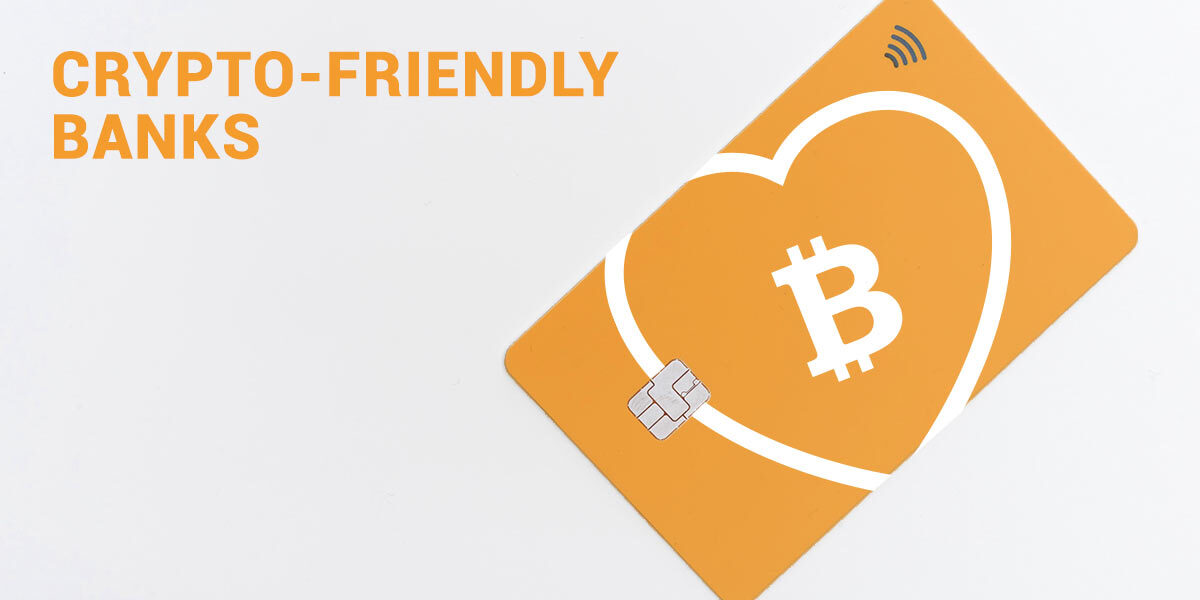The rise in cryptocurrencies among users worldwide created a need for crypto-friendly banks. While buying and selling crypto is relatively straightforward and easy, dealing with permissions and regulations might not be. Therefore, it’s really important to know your options to trade cryptocurrencies in a safe environment.
In this article, we’ll discuss USA and EU options, as well as briefly define these financial establishments, and their pros and cons.
Contents
- 9 Best Crypto-Friendly Banks in the USA
- 5 Best European Crypto-Friendly Banks
- What Are Crypto-Friendly Banks?
- Pros & Cons of Crypto-friendly Banking
- Conclusion
- FAQ: Crypto-Friendly Banks
9 Best Crypto-Friendly Banks in the USA
The American banking industry has always been different from the world’s equivalents. Mainly it is due to the very large number of very small banks and tough regulations on tax compliance. Therefore, not many banks have much to offer. Still, we gathered a list of crypto-friendly banks in the U.S:
Ally Bank
Considered as one of the best crypto-friendly online banks. Ally Bank’s main features are Coinbase integration and the possibility to do stock investments without commission fees. However, it doesn’t allow users to directly buy crypto and keep it on the accounts. Although, there’s a loophole: customers can link their accounts to Coinbase as they normally do with any outside bank account. So it doesn’t exactly allow buying cryptocurrency directly at the bank, but, hopefully, they are moving in this direction.
USAA
This bank is based in Texas and the abbreviation stands for United Services Automobile Association. USAA offers different financial services apart from bank accounts, including insurance policies, auto loans, and investment options. Killer feature: users of Coinbase can monitor their crypto balance directly through the USAA app and purchase Bitcoins with their debit cards.
Not only is USAA one of the most Bitcoin Friendly Banks, but it’s also beneficial for those who are looking for extra financial services.
Bank of America
It’s one of the largest American banks with a subsidiary, Merrill Edge, that can be used for crypto investments. Merrill Edge is a user-friendly online trading platform launched in 2010. The platform enables bank customers to invest in ETFs (exchange-traded funds). You can’t buy crypto with their card directly, but you can link your Coinbase account.
The good news is that in 2021, Bank of America created a position for a head of digital trading. In theory, this person will deal with investments in digital assets.
Goldman Sachs
The well-known International NYC-based crypto-friendly bank with a long and controversial history around crypto. In 2017, Goldman Sachs planned to enable crypto trading, but in 2018 the plan was suspended because of reasonable concerns around regulation in the U.S.
In 2021, crypto trading became available. Currently, Goldman Sachs supports the trading of Bitcoin futures, offers access to Ethereum funds with a minimum deposit of $250,000, and is looking into a Bitcoin ETF.
Knowing how vulnerable are their decisions around crypto’s volatility, it’s different to predict what would happen after 2022.
OnJuno
This is no doubt a very strong player on the market if you’re asking which banks are crypto-friendly. Their customers can get paid in crypto, trade crypto with checking accounts, and all of these with zero fees. While some banks require a week of waiting to withdraw crypto, with OnJuno you can do it immediately.
Killer features: high-yield accounts, cashback, low fees, responsive customer service.
Wirex
Generally a very good option for those who are seeking an opportunity to deal with crypto in daily life. Wirex is not really a bank, it’s rather a digital payments platform that made a real noise in the USA. Their customers can trade US dollars and 37 different cryptocurrencies through the mobile app. Wirex technology links the app to a Visa debit card with an NFC module, meaning users can pay directly to merchants in crypto.
Killer features: crypto debit card, free ATM withdrawals (including international), a choice between Visa and Mastercard, no annual fee or exchange fees, cashback, and very fast crypto transactions.
Chase
New York-based, JPMorgan Chase, is an international investment bank trying its best to introduce cryptocurrency to the traditional banking system. Except for regular banking services for businesses, they do home loans and more. Currently, Chase’s customers are able to link their Coinbase accounts to exchange cryptocurrencies.
What’s important to mention here is other crypto initiatives by JPMorgan Chase:
- In February 2021, the bank created its own digital asset, JPM Coin. The aim was to facilitate international payments.
- In August 2021, a Bitcoin fund was launched. The Grayscale and Osprey Funds are open to the public, whereas the NYDIG fund is only available for private banking clients.
Morgan Stanley
Based in New York City, Morgan Stanley is a multinational bank that offers wealth management clients access to Bitcoin-related funds since 2021. Actually, they were the first bank to offer Bitcoin to US citizens. At the moment there are three funds: the Galaxy Institutional Bitcoin Fund LP, the Galaxy Bitcoin Fund LP, and the FS NYDIG Select Fund.
Bitcoins, however, are not available for each customer, but only to high-net-worth individuals. Another catch is that customers can’t just buy Bitcoin as a cryptocurrency, but rather participate in the Bitcoin funds. Founders say that if this “experiment” shows a profit, access will be given to general banking customers one day.
QUONTIC
The last bank on our USA list is also a New York-based digital bank. Killer feature: the first-ever Bitcoin Rewards checking account. It is like cashback but not exactly. Customers get 1.5% Bitcoin worth on all eligible debit card purchases. You basically earn crypto by making daily purchases.
It is worth mentioning that the opening minimum is $500, and there is no requirement for a minimum daily balance.
5 Best European Crypto-Friendly Banks
Now let’s take a look outside of the U.S. and see which banks are crypto-friendly in Europe.
BANKERA
This is a relatively new financial establishment offering a “bank account alternative” that is linked to the crypto exchange SpectroCoin. Customers of Bankera are able to receive a personal IBAN that will enable them to withdraw and receive funds from SpectroCoin balance. There’s also an opportunity to convert Bitcoin to EUR and put it on a debit card.
Bankera is available worldwide except for the US and countries that are under heavy financial sanctions, like Russia, Iran, and North Korea.
NURI (Formerly Bitwala)
This German bank has made crypto a major segment of its platform. With NURI, customers can get a German IBAN, SEPA transfers are supported, and desktop and mobile app versions are available. NURI is one of a few European banks that made it possible for customers to keep crypto and cash in one place. Accessible in EEA, Switzerland, the United Kingdom.
Change
It is a little bank created in Estonia in 2016 with the main idea of making investing more accessible. Their services include crypto trading, stocks, other traditional assets and investment options, but their killer feature is a crypto-friendly Visa debit card. Available in EEA countries.
Fidor Bank
A German online bank founded in 2009. Killer feature: a partnership with the local platform bitcoin.de and Kraken. Fidor bank customers can access their crypto assets directly through their dashboards in the mobile app for the bank. Fidor considers itself an innovator in the usage of virtual currencies and is aiming to build up global expertise.
Revolut
Probably the most famous and also the newest bank on our list. UK-based and founded in 2015, but by 2020 it expanded also to the U.S. It is a classical online bank without physical branches, they offer the possibility to buy Bitcoin (or a range of other crypto assets) through the app directly. Killer feature: customers can set up an auto exchange that instructs the application to buy crypto coins when the rate reaches a specific price.
Revolut is available in EEA + Switzerland, the UK, the USA, Australia, Singapore, and Japan.
What Are Crypto-Friendly Banks?
When crypto started gaining popularity, people all over the world started looking for options on how to buy a certain coin (we all know which one). Creating a crypto wallet occurred to be not that easy. Moreover, selling coins to fiat and withdrawing the money in case of unsuccessful investments became another nightmare.
Being able to buy crypto directly with your bank account and keep it in a more convenient environment started to be a dream of every crypto investor. At the same time, not many banks want to take the risks and deal with assets that have high volatility.
Thankfully, in 2022 the situation has changed and we’ve got a range of crypto-friendly online banks that simplify the process of trading. When the bank is crypto-friendly, it means you can do certain actions connected with crypto directly from your bank account. It can be buying or selling coins, trading, depositing, etc.
Pros & Cons of Crypto-friendly Banking
Now that we know the options available in different parts of the world, let’s take a look at the advantages and disadvantages.
Pros:
- Simplicity. Obviously, customers go for crypto-friendly bank options because they want their life to become easier when using crypto. And it does work this way. Also, these new banks are usually modern and really easy to use.
- Reliability. Unlike decentralized crypto wallets, banks are able to restore access if you lost your password or seed phrase. Also, crypto-friendly banks usually have large trading volumes, and this guarantees a good liquidity supply.
- Security. Not every bank offers this option, but often users can transfer assets without revealing their personal details. Everything is confidential unless you want it to be the opposite.
- Cashback and bonuses. It depends, but sometimes you can get special rewards for using crypto as an asset.
Now let’s see what’s the catch!
Cons:
- Hacking risk. Banks are centralized establishments, meaning there is always a risk of a data breach that can turn into losing assets.
- Liquidity struggles. When banks have low liquidity, crypto holders may have difficulties getting buyers and sellers for asset exchange.
- Volatility. Crypto is famous for being extremely explosive in exchange rates. When using crypto to trade and earn it’s one thing, but trying to pay with crypto for daily things might be difficult as you can’t predict the coin price. That’s when stable coins come into help, but not many crypto-friendly banks support stable coins.
Conclusion
Crypto, no doubt, is taking over the world day by day. Thus, the rules and regulations in this market are constantly changing. It is truly amazing that the modern banking system understands the importance and the potential of crypto and makes changes accordingly. Sooner or later crypto will become compulsory in our everyday life, it is just a question of time.
In 2022 there’s a good amount of crypto-friendly banks to choose from. Whether you are looking for an option to store your savings or trade regularly, we are sure that this article has helped you to figure out which banking instrument is better for you.
FAQ: Crypto-Friendly Banks
Yes, unlike 3-5 years ago, in 2022 the situation is way better. Nowadays you can find many crypto-friendly banks in the United States of America, European countries, Australia, and some Asian countries. In this article, we described 15 of the most popular banks to choose from.
Traditional bank institutions do not support any services related to crypto and do not allow storing it or trading. However, crypto-friendly banks tend to integrate different opportunities for crypto users, whether it’s creating a crypto account or allowing linking bank accounts to one of the crypto exchange platforms.
The short answer is that from the banks’ point of view, Bitcoin is volatile and insecure. Banks do not want to deal with high risks of price changes, fraud, etc. While it may not be the case, centralized banks are against a decentralized currency that doesn’t belong to anyone and can’t be controlled by any government.



2 Comments
RobertPeeme
Crypto are incompatible with the banking system. No matter how hard they try
Barbara
I am regular reader, how are you everybody? This
paragraph posted at this site is truly nice.